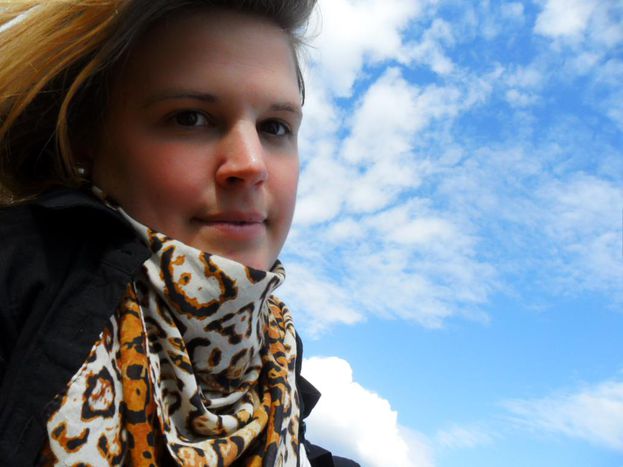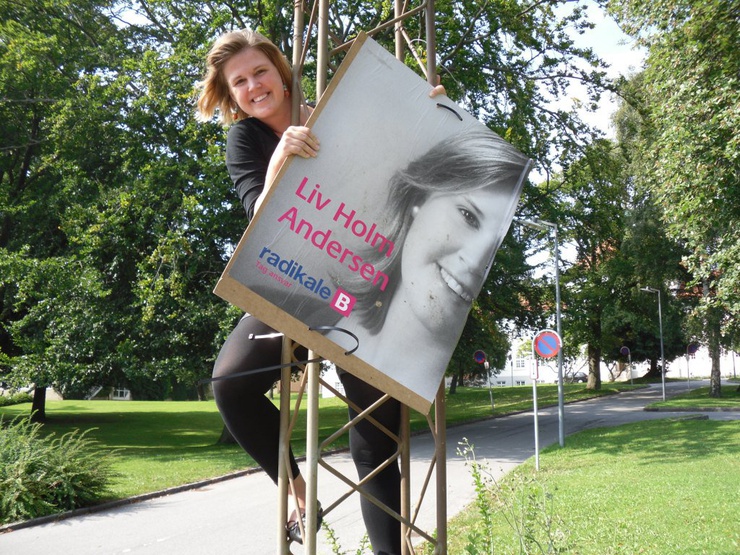
Liv Holm Andersen: 'Danes like to lose their sense of security'
Published on
She talks and laughs with Mediterranean hand gestures and speaks a bit of Greek, but don't be fooled. The 24-year-old is actually one of Denmark’s youngest politicians, a candidate for the Scandinavian’s country’s second smallest party Radikale Venstre in elections on 15 September. In Athens, we talk Europe, the Balkans and learning from Spain
It is no surprise to hear that Liv Holm Andersen became interested in politics at an early age. By the time she was 15, she had been introduced to the debating society at school by a teacher who was a social democrat. 'I chose to study political science at university because I wanted to become a politician and not the other way round,' explains Liv. After joining a university political party, she had experience in launching her own campaign. It stood her in good stead: Andersen is a candidate with Radikale Venstre (Danish social liberal party) for the national elections on 15 September at the age of 24.
Denmark and Balkan challenges
Andersen’s European perspective was influenced by her experiences as a six-year-old living in the town of Støvring in the north. Bosnian families fled to Denmark from the former Yugoslavia, and Andersen's parents hosted one such refugee family. It was when Andersen realised there was a world beyond Denmark. Having spent six months working for the Danish embassy in Athens, Andersen supports what she calls the ‘Greek approach’; the Greek foreign ministry supports the accession of the Balkan countries to the EU with agenda 2014.
'Denmark is nowhere near the Balkans, so people just don’t care’
'Unlike Greece, Denmark is nowhere near the Balkans, so people just don’t care,’ admits Liv. ‘The general feeling is that now people have stopped killing each other we don’t have to worry anymore. That’s wrong, because there is still tension in the region. A new crisis would cause a lot of suffering and lead to huge instability throughout the region. The Balkans are in the heart of Europe. The EU has to pay for the fact that we didn’t stop the war in our own backyard in the 1990s, by helping these countries towards a good and wealthy future. The biggest challenge in the Balkans is stability, especially with ethnic tensions in Kosovo, the muslim region of Sandzak in Serbia, FYROM and Bosnia.’
Danish euroscepticism
‘She is Danish you know!’ I remark to the couple watching us next to our table in Buenos Aires, an Argentinean café in the centre of Athens. Liv knows some Greek words, and is shrewd about shared problems between both countries, such as tax. Denmark is not in the eurozone, and so less affected by the current crisis – Greece is 335 billion euros in debt. But it has one of the highest rates around the world, ranging from 39% - 63% . ‘If income is higher than 390, 000 Danish crowns, we add another 15% to that part of the salary to ensure that larger incomes are taxed more,’ explains Andersen.

‘The social heritage is of paying our taxes ‘with a smile’. Every political party believes in the welfare state. Where Greeks ask themselves if they really want the state or not, in Denmark, everybody knows it works quite well and takes care of lower social groups in need, in protecting the rise of the crime rate and so on. This is our history! The strongest shoulders carry the weakest shoulders for everybody’s benefit. But Danes are also a bit afraid. Their social system and welfare state simply functions compared with Greece, Italy or Spain. But we cannot impose a social system for Greece just because it works in Scandinavia.’ Flexicurity is the word. According to the world bank group, Denmark has the most flexible labour markets in Europe. It is easy to hire and fire (flexibility), and between jobs, unemployment compensation is very high (security). ‘The best solution would be to inspire each other and help each other to get things to work, such as when there was the asylum crisis in Greece, and Danish politicians came here to help.’
Spain as a model
Andersen is more attracted by the idea of a political career at home than by one in Europe. Danes are polarised about the EU, which it joined in 1973, she muses. ‘Being Danish is enough, as Danish society is doing well politically and economically. The EU is perceived to be a waste of time by many. The idea is that somehow the Danes will have to make sacrifices to the EU but won’t gain anything themselves. Whilst intellectuals and business people say that they understand the necessity of the EU, others claim, ‘why a European and not an international community?' Liv believes that Denmark should collaborate more closely with the EU. ‘Cross-border problems cannot simply be solved here alone. These include pollution, illegal immigrants and drugs. Nationalists say we should close our borders. Isolating ourselves in our own small country will not help us to solve problems in the long run.'
‘Being Danish is enough'
Danes may be ‘eurosceptic’, but that doesn’t make them inward-looking. ‘Scandinavians like to travel to experience adventure,’ smiles Liv. ‘We are very satisfied with our lives but we like to lose this sense of security. We are one of the happiest nations in the world, but we are not sparkling people. We like going to Italy, Greece and Spain, to more open, outgoing and somehow happier people. We know we can return to our secure little home.’ Liv herself spent one year in Spain. ‘I liked its move towards becoming a more liberal society. It creates more possibilities for individuals and to get rid of the cultural and religious heritage that has been present in politics for many years. It’s admirable that they are making an effort to separate political and cultural ideas, such as limiting the church’s power. I was astounded by the huge paradox that Spain allowed homosexual marriages before Denmark.’ Europe isn’t only about cooperation, Liv affirms, but also about learning from other countries.
Read more from the official cafebabel.com blog in Athens
Images © courtesy of LHA



